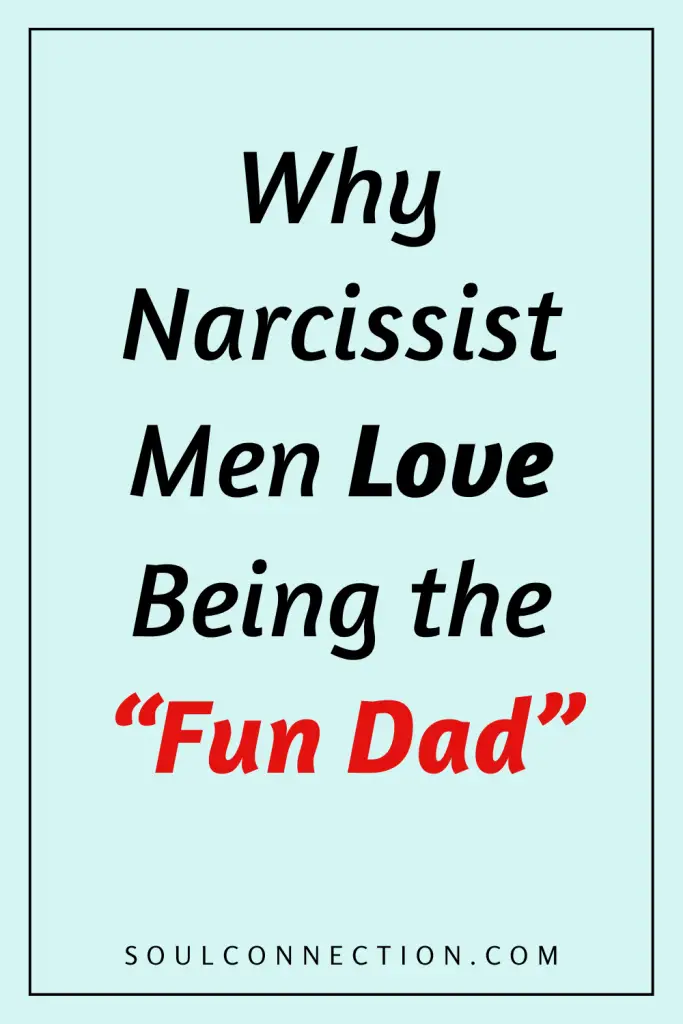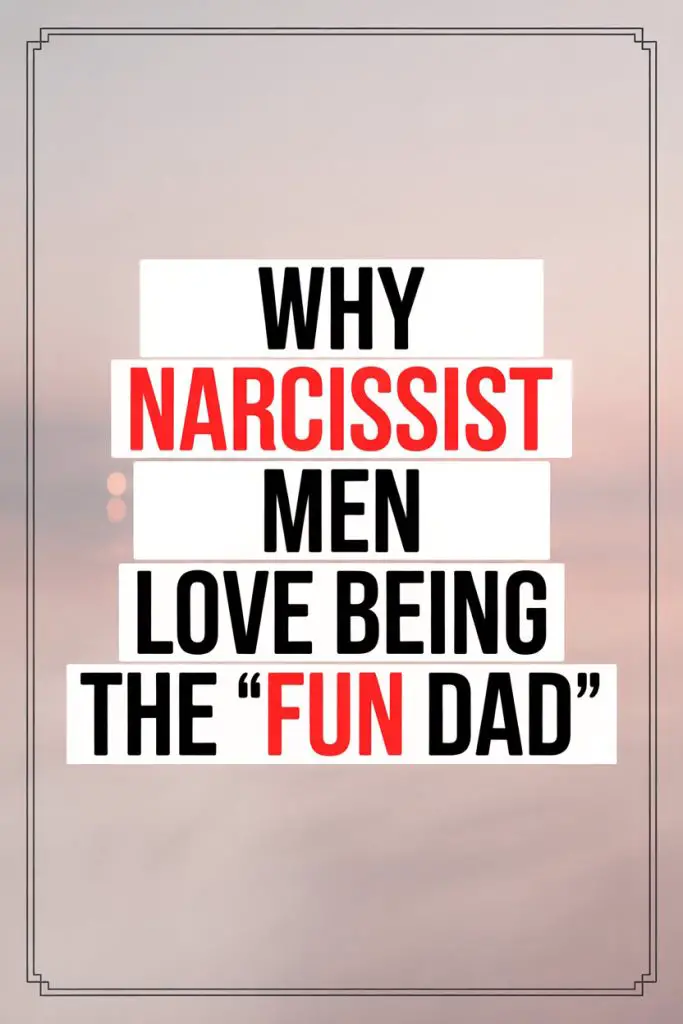Some dads show up to school plays with a camera and a cardigan. Others barrel in, sunglasses on, pockets full of gum, and a plan to take the kids out for milkshakes at 9 p.m. on a school night.
If your co-parent is the latter—and also throws tantrums when the spotlight shifts—you might be dealing with a “fun dad” with a narcissistic streak.
This isn’t just about different parenting styles or someone wanting to be the cool parent. There’s a particular dynamic at play when narcissism meets fatherhood, and it can leave everyone else feeling like the supporting cast in Dad’s Big Show.
Ready to see what’s really happening behind those spontaneous trips to theme parks and the “rules are boring” speeches?
The “Fun Dad” Persona: Spotlight, Please
Narcissist men adore attention the way toddlers adore glitter. Being the “fun dad” is the perfect stage.
The role comes with built-in applause—delighted kids, impressed neighbors, and parents at school pick-up who say things like, “Wow, your dad’s a riot!”
Every magic trick, every ice cream sundae breakfast, every YouTube-worthy prank is a chance to hear laughter and see admiration reflected back.
It’s not just about making memories; it’s about collecting moments where Dad is the uncontested star.
If adoration were a vitamin, the “fun dad” would buy it in bulk.
Rules Are For Suckers (Unless He Makes Them)
One hallmark of narcissism is a casual relationship with rules: they’re for other people, not for the fun parent. School night? Bedtime is “when you’re tired.” Chores? “Hey, life’s short, let’s go out instead!”
That’s not generosity—it’s a power play. By discarding boundaries set by the other parent, the narcissistic dad positions himself as the liberator, the hero who understands what “real fun” is.
Meanwhile, the rule-enforcing parent becomes the villain in this little family drama.
Who wants broccoli when Dad’s offering pizza and a side of “Mom’s no fun, eh?”
Emotional Validation on Tap
A key feature of narcissism: an endless thirst for external validation. Kids, especially when they’re young, are bottomless wells of enthusiasm and admiration.
Dad builds a pillow fort. Kids go wild. Dad buys tickets to the latest blockbuster. The crowd roars! Each cheer is proof that he’s a great father, a cool friend, a guy who gets it. It’s instant, uncomplicated feedback.
No need for self-reflection or uncomfortable talks about feelings—just rinse, repeat, and keep the applause rolling.
Shortcut to Hero Status
Being the “fun dad” is a fast lane to family legend status. Forget the hard work of day-to-day parenting: the discipline, the patience, the “no, you can’t have another biscuit at midnight.”
Why invest in the slow, often invisible process of building trust, when you can swoop in with last-minute theme park tickets or new gadgets? The “fun dad” narrative sidesteps the marathon of parenting and makes it all a series of highlight reels.
Unfortunately, it’s a bit like trying to live on nothing but dessert: eventually, you’ll want something more substantial.
The “Good Cop, Bad Cop” Routine
Kids aren’t the only audience for this performance. The “fun dad” role sets up a very convenient dynamic if you’re co-parenting. One parent enforces limits and boundaries; the other sweeps in with treats and late-night movies.
This breeds resentment—kids against the parent who sticks to the rules, kids idolizing the one who doesn’t.
The narcissistic dad thrives in that environment, using the division to prop up his own self-image, all while sidestepping the messier parts of parenting.
Handy, isn’t it?
Grand Gestures, Short Attention Span
The “fun dad” excels at big, showy moments—trips, parties, surprise gifts. But try asking him to help with algebra homework or patiently listen to a long-winded story about a playground squabble, and you’ll see the curtain drop.
Narcissists often struggle with the unglamorous side of parenting. The everyday nurturing, the emotional labor, the quiet support—those things don’t offer the quick, public payoff that a flashy day out does.
It’s not that he doesn’t care at all; it’s that he’s wired to chase the next rush, not build the slow-burning relationships kids really need.
Undermining the Other Parent
Nothing says “main character energy” like making Mom or the other parent look like the villain. Narcissistic dads subtly (or not so subtly) chip away at the credibility of the parent who enforces boundaries.
It’s “your mum’s just stressed,” or “he’s too uptight,” or “don’t worry, I’ve got your back.” The aim? To ensure the children’s loyalty and affection remains firmly with him—and to keep the other parent in a constant state of damage control.
It’s not co-parenting; it’s competition.
The Illusion of Connection
On the surface, it can look like the “fun dad” has an amazing bond with his kids. There’s laughter, inside jokes, selfies galore. But the connection is often skin-deep.
The narcissist’s focus is rarely on what the child actually needs or feels. It’s about the experience, the moment, the story he can tell later—“Remember when I took you all to see the fireworks instead of doing your homework?”
Kids can sense when love is conditional, when Dad’s attention is there only as long as they play along. The relationship starts to feel less like family and more like an audience.
What It Feels Like on the Other Side
Living with, or co-parenting with, a narcissistic “fun dad” can range from infuriating to exhausting. You’re left to sweep up after the sugar rush, enforce the rules, and nurse kids’ feelings when Dad disappears or disappoints.
Resentment can build. Children may struggle to understand why the “fun” parent seems to win every time, or why their feelings get trampled when the curtain closes and Dad is “busy” again.
And let’s be honest: it’s lonely being cast as the “boring” parent when you’re the one doing the heavy lifting.
How to Respond (Without Losing Your Mind)
It’s not defeatist to admit you can’t out-fun a narcissist. The good news? You don’t have to.
Kids crave consistency, predictability, and genuine connection far more than wild rides and unlimited ice cream. Here are some strategies to reclaim your sanity and support your kids:
- Hold your ground: Keep boundaries firm and consistent. Kids may grumble, but structure is a gift—even if they sometimes act like it’s broccoli.
- Stay out of the competition: Refuse to play the “who’s more fun” game. Focus on being the parent your child can trust and rely on.
- Talk about feelings: Encourage honest conversations about how certain actions (including dad’s) make them feel. This builds emotional literacy and resilience.
- Watch for triangulation: If Dad tries to pit you against the kids, calmly point out that families work best when everyone treats each other with respect.
- Prioritize the long game: While the “fun dad” grabs headlines, you’re building a foundation that lasts. Steady wins the race—even if it’s not always glamorous.
When the Curtain Falls
The “fun dad” routine looks great in short bursts, but it’s not sustainable. Kids grow up. They begin to notice who’s there for the little things, who listens, who follows through.
The sparkle of “fun” fades fast when there’s no substance behind it.
If you’re parenting with a narcissistic “fun dad,” know that your efforts matter more than you realize.
The quiet, everyday love you show—yes, even through the broccoli and the bedtimes—plants seeds that grow into genuine security and trust.
One day, your children will see the difference.
And you? You’ll be the parent they thank for showing up, day after day, even when there wasn’t an audience.


